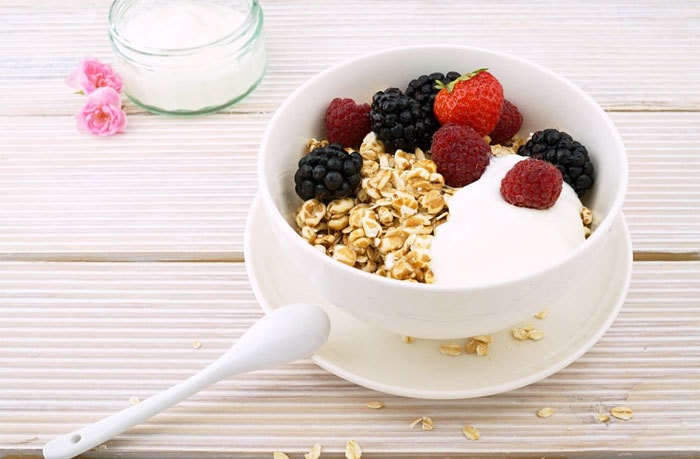
Written By: Gloria Tsang, RD
Title: Founding Registered Dietitian
Alumni: University of British Columbia
Last Updated on:

Snacks can add up to a lot of calories if we are not careful in what we choose. In fact, when snacking is done right, it can actually help you to become healthier! Here we go.

Table of Contents
Not only are bananas creamy and sweet, they are also nutritious and are available year-round. Just eat bananas as is, toss them in your breakfast cereal, or simply blend bananas with low-fat milk to make a delicious smoothie. This grab-and-go snack is a good source of vitamin B6, vitamin C and fiber as well as manganese. In addition, a piece of banana provides approximately 460 milligrams of potassium, making it a heart-friendly health snack.
Yogurt is a very versatile food and a healthy snack. It can be enjoyed on its own, used as a fruit dip or mixed as a sauce or dressing. Not only does this creamy snack provide protein, calcium and potassium; it also contains active live bacterial cultures (also known as probiotics). Studies have shown that probiotics improve gastro-intestinal health. It may enhance immune functions as well. Unfortunately, not all yogurt contains probiotics. L. bulgaricus, S. thermophilus and L. acidophilus are the most common bacterial strains added in yogurt. Therefore, look for these bacteria on the ingredient list. Also, check the label and look for the words “live cultures” or “active cultures.” Avoid yogurt that says “heat-treated after culturing” on the label..
Nuts are one of the best plant sources of protein and make for a great snack. They are rich in fiber, phytonutrients and antioxidants such as Vitamin E and selenium. These tasty snacks are also high in plant sterols and fat – but mostly monounsaturated and polyunsaturated fats (omega 3 – the good fats), which have all been shown to lower low-density lipoprotein or LDL cholesterol.
In 2003, the FDA recognized the benefits of nuts and their role in heart disease prevention by approving a health claim for seven kinds of nuts (almonds, hazelnuts, peanuts, pecans, some pine nuts, pistachios and walnuts). There is one catch though: nuts are high in calories. Therefore, the best approach is to reap the health benefits of eating nuts as snacks without add excessive calories to your daily intake. So, instead of simply adding nuts to your diet, eat them in replacement of foods that are high in saturated fats such as meat and limit your intake of these tasty snacks to one to two ounces per day.
Craving for a healthy snack on movie nights? How about popcorn? A standard three-cup serving of air-popped popcorn contains just 93 calories and less than 1.5 grams of fat. These low-calories snacks are considered whole grains, which have some valuable antioxidants not found in fruits and vegetables. They also contain B vitamins, vitamin E, magnesium and fiber. The new 2005 Dietary Guidelines for Americans recommend that all adults eat half their grains as whole grains. That’s three to five servings of whole grains a day. If you prefer microwave popcorn, choose the plain one if possible and avoid the “buttery” or “caramel” microwave popcorn that may be loaded with calories, sugar and trans fat.
Alumni: University of British Columbia – Gloria Tsang is the author of 6 books and the founder of HealthCastle.com, the largest online nutrition network run by registered dietitians. Her work has appeared in major national publications, and she is a regularly featured nutrition expert for media outlets across the country. The Huffington Post named her one of its Top 20 Nutrition Experts on Twitter. Gloria’s articles have appeared on various media such as Reuters, NBC & ABC affiliates, The Chicago Sun-Times, Reader’s Digest Canada, iVillage and USA Today.
bananas, healthy snacks, nuts, popcorn, snacks, yogurt